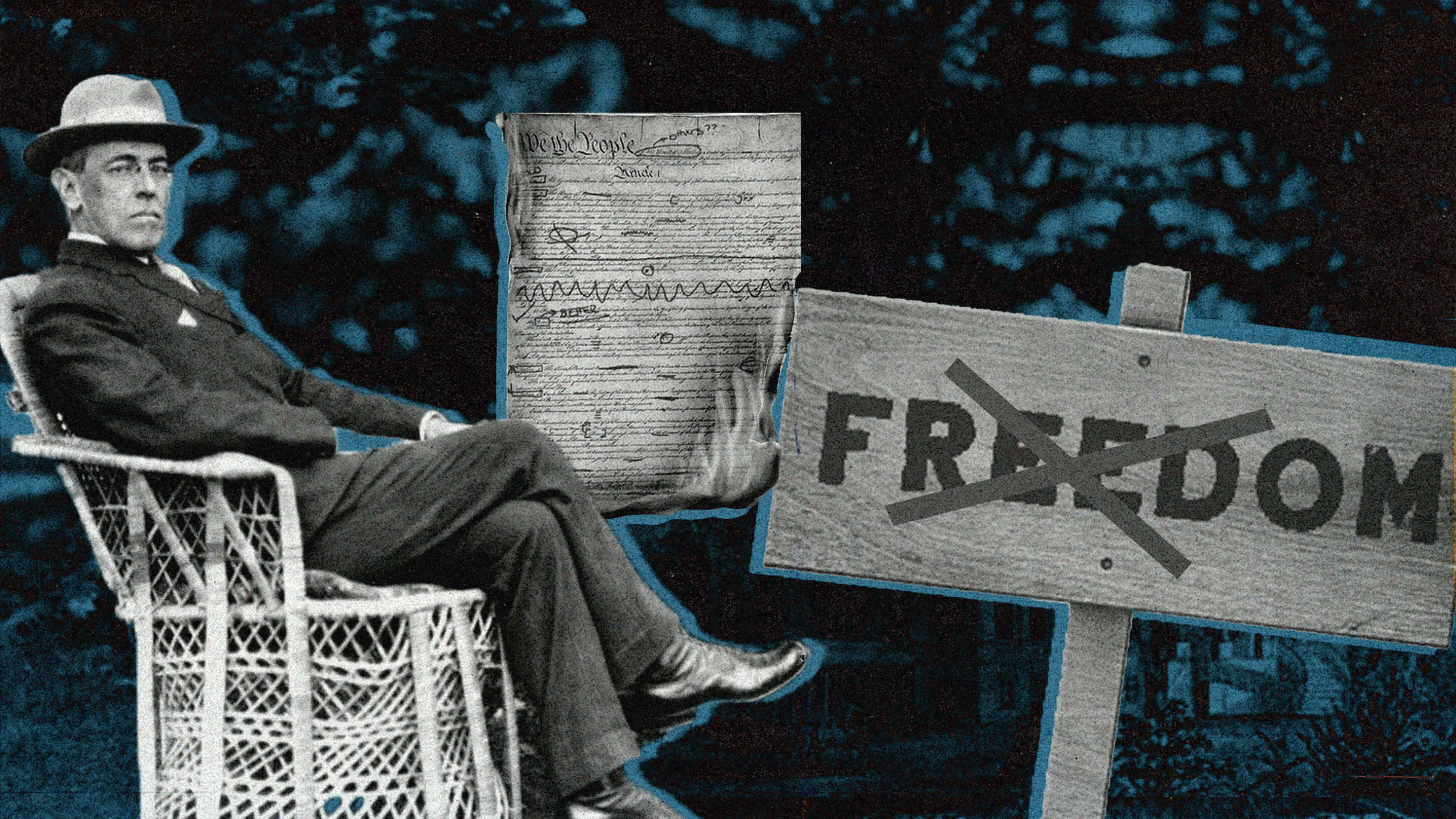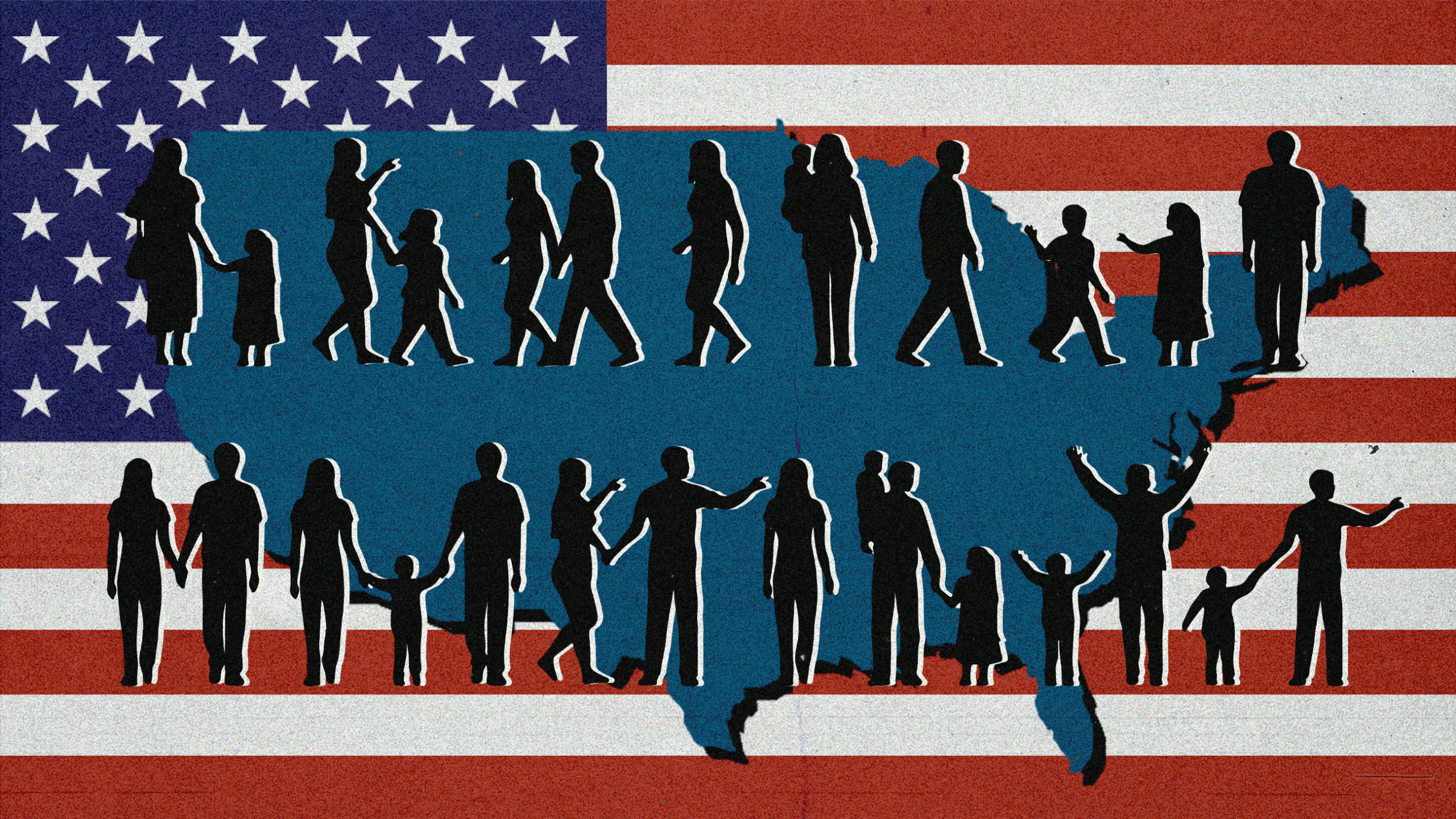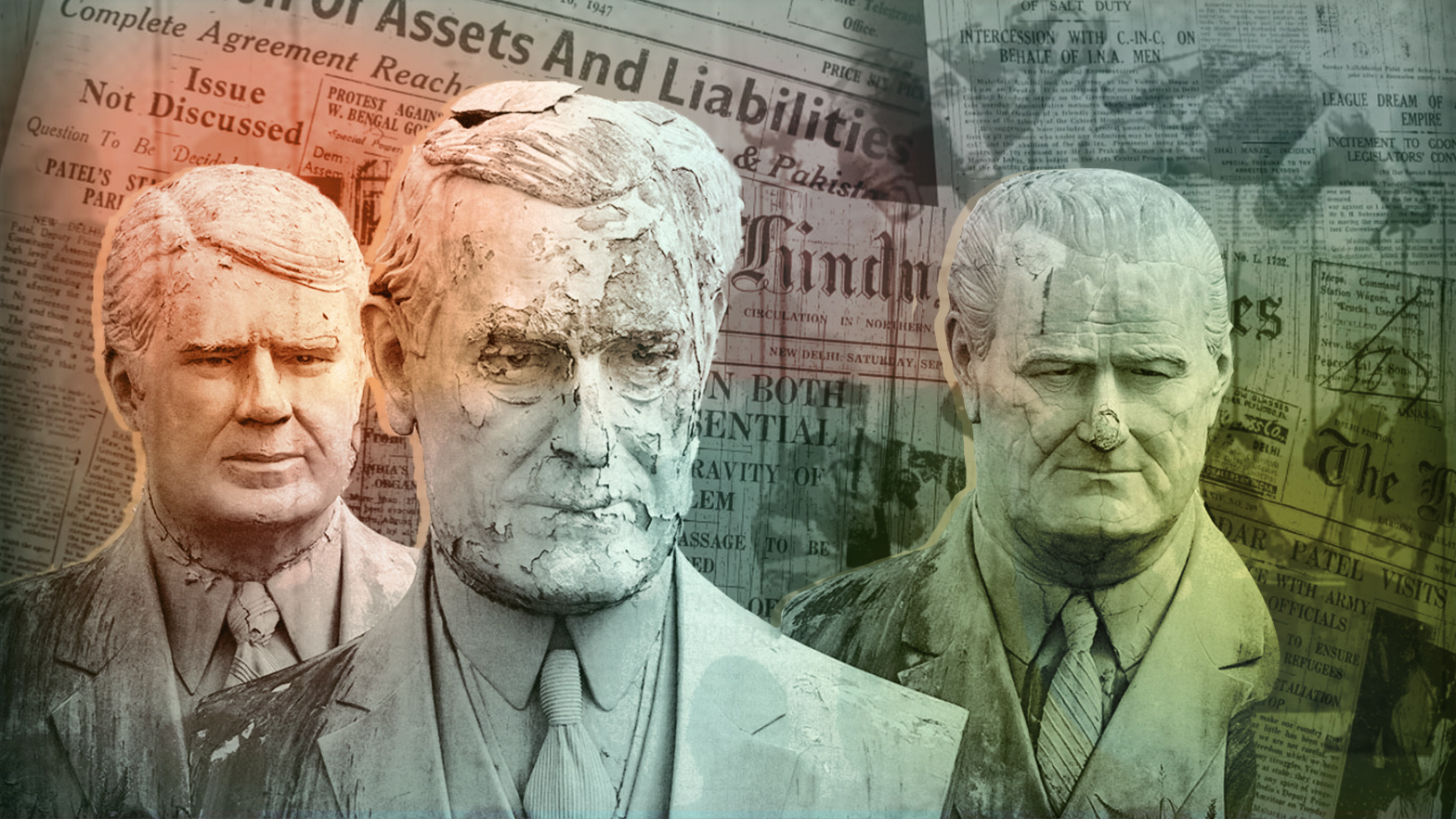Whom does perpetual immigration serve?
What is Our Regime?

The real “great replacement” is the replacement of America’s constitutional republic.
The following transcript is from a speech delivered at an event entitled “Lies of the Ruling Class,” hosted in May 2022 at the Claremont Institute’s DC Center for the American Way of Life.
It is not just some crazy notion at the Claremont Institute, some crazy right-wing think tank’s invention, that we no longer live under the Constitution. The Left has been trying to undermine and overturn the Constitution for a long time. That agenda has been consistent. And the only thing that’s really changed is the rhetoric. The Progressive movement is where the attack on the Constitution first started more than a hundred years ago. And the most famous proponent of that was Woodrow Wilson, the only political scientist to be president of the United States. That tells you something right there—his being a political scientist.
And he was very open about repudiating both the Declaration of Independence and the Constitution as relics of the 18th century that had no relevance to the modern world. That’s where this all started. But it was a little too bold, and it’s not an accident that Wilson was followed by 12 years of Republican presidents: Harding, Coolidge, and Hoover. Then, Franklin Roosevelt came along. Roosevelt didn’t change the agenda, but he did change the rhetoric.
And that’s where the Left started adopting this idea: they’re actually defenders of the Constitution, but they simply tweaked, and redefined, and reworked all of the concepts. And so, you’ve got a living Constitution, and you’ve got all this language about rights, but they were no longer the natural rights that the founders defended. They were a whole series of invented new rights that the government would bestow on us, rather than natural rights that the government would protect.
This has been going on a long time, and I just established that as some background. I’m going to give three examples. Whenever I give one of these talks, I’m told, “Don’t get too theoretical.” But part of what the Claremont Institute does is show the connection between theory and politics. And I’m going to touch on a couple of theoretical principles of what the older Constitution meant. But I want to show how it applies practically in a concrete political way. Because I think theory helps you to see the big picture. Wars are won by a series of tactical victories, but someone has to put all the tactical victories together in terms of strategy. I think that’s what the Claremont Institute does.
One prefatory remark. Charles Kesler, who is one of our great scholars at the Claremont Institute and a teacher of mine, recently wrote the book called Crisis of the Two Constitutions, which basically establishes this theme we’re going to talk about, that the older Constitution has been replaced. I would quarrel a little bit with my teacher’s language because I don’t think the new regime, the new progressive oligarchy, is in fact a constitution. It’s not only not a constitution, it’s opposed to constitutionalism. And in a way, it’s not even a government, because what the ruling class is doing transcends the government. It transcends even the nation. It’s a reworking of all society and on a global scale. So, I would say what’s happening is more than just a crisis of two constitutions.
One last prefatory point: I think it’s clear that we’re no longer living under the founders’ constitutional republic. Where we are in this ongoing process, I don’t know. Reasonable people can disagree with that. Some of us are more black pilled, as they say, than others. But clearly, I think it’s indisputable that we are now very far, indeed, from the constitutional republic that the founders created. I’m going to establish a pair of concepts of what constitutional republicanism requires, and then talk about what is being replaced. And by the way, this is the real great replacement. I agree with those who talk about the demographic replacement. That’s perfectly true. The Left both typically admits it and denies it depending on what’s convenient. But the real great replacement is the replacement of the old Constitution with the new Progressive form of rule and what you can call the Constitution from our government.
Equality and Equity
The first example is equality and liberty. These are two essential pillars of any form of constitutional republicanism. And they go together. They’re corollary principles. Because we are equal, we are free—because none of us can rule another without consent. That equality is what justifies and authorizes our liberty. And we have liberty because we’re all politically equal. None of us is a god or an angel, and none of us is a beast. So, these concepts go together. And they are now being replaced by another corollary, which the Left calls equity and diversity. Let me just contrast these.
Equality and liberty, as the founders understood them, meant real freedom of association. Under constitutionalism, the main division in societies was between public and private. And most of life would be lived in the private sector, where people would be free to operate within bounds of the law, but have extraordinary freedom to live their lives, form businesses, go to churches, go to schools, live where they want, associate with who they want. And they would typically associate with other people who share their interests, share their cultures, and have other things in common. And this would lead to a great deal of natural diversity—diversity that arises from free people exercising their freedom.
What the Left has decided, though, is that people can’t be trusted to exercise their freedom. It results in the wrong kinds of diversity. Now, the great turning point here was the 1964 Civil Rights Act. And I don’t want to rehearse the arguments about what was intended, but certainly, the effect of the act was to all but abolish freedom of association in the United States. We now live under this vast architecture of anti-discrimination laws, which is not even limited to the public sector. And I will return to this idea that the public-private distinction is now being replaced by a different distinction, which is the ruling class versus the people.
But these anti-discrimination laws are not just confined to the public sector. They apply throughout our lives. And there is no form of constitutionalism in which these minute forms of anti-discrimination law obtain, to the point where a woman who wants to rent out a room in her home is subject to federal regulation governing what may or may not constitute discrimination. And so, in place of the natural diversity that arises from free people interacting with each other, we now have the ruling class deciding what, from their idea of equity and diversity, the appropriate outcomes could be.
Consent and Expertise
Next I’ll contrast another two pairs of principles: consent and the rule of law under the Constitution versus, under the new regime, expertise and bureaucracy. According to the original view, the people consent, both as a body in the original social contact and, when we each reach the age of maturity, individually by choosing to live in the regime when we could leave. This original form of consent is reciprocal. We consent to live in this political community, and the political community itself is supposed to consent to who’s going to be part of it. The notion of open borders—that we the people have no right to decide who’s going to be part of our political community—is an absolute repudiation of consent as the framers understood it.
But the idea of consent goes along with the idea of the rule of law, that we consent to allow the government to exercise its power to protect our rights. And for the most part, this would be through laws of general applicability enacted through Congress, which is the Article I branch of the federal government. But since people can’t be trusted to exercise their freedom, elections in the new Progressive oligarchy are really merely formal or symbolic. This sounds strange, but really the way the oligarchy looks at it, elections merely ratify the legitimacy of the ruling class to rule via bureaucracy. When if elections go the wrong way? They’re resisted, they’re opposed, they’re undermined. The bureaucracy will slow roll, leak, and sabotage any undesirable results of the election.
If someone stands in the way of “progress,” his election is not valid in their mind. This needn’t come down to fraud or any of those things: the election is simply not recognized, and therefore, it’s opposed. Whereas when elections go the right way, the throttle is opened up to a hundred percent and the left pursues its agenda, full bore. You can see this right now with all the problems the country is facing: inflation, the debacle at the border, all sorts of problems. What is the Left doing? They’re creating a ministry of propaganda. These are people who are not bashful about pushing their agenda.
And then, in place of rules of general applicability, we have the bureaucracy, which cannot be bound by general laws because it has to manipulate the outcomes in very subtle and flexible ways. It can’t be bound by a constitutional institution because its ambitions are not bound. The aim of the progressive oligarchy is to remake society to solve every problem. And therefore, it can’t be bound by laws. Wilson was quite frank about this a hundred years ago. Because it has to fix every problem, it has to have unlimited power. Its ambition is unlimited, and therefore, its power has to be unlimited.
The most telling example of these truths, which the people in this room know very well, was the federal government’s reaction to COVID. The administrator par excellence of the modern world is Anthony Fauci, who certainly did not see himself as beholden to any elected member of Congress. And look at the way our society was turned upside down. The economy, small businesses, the lives of school children—a vast change in the way we live our lives without a single law ever being passed by the United States Congress.
The Real Rulers
Finally, the most fundamental aspect of constitutional government is the idea of a sovereignty of the people—that all political power only arises legitimately from the people. The Revolution was a revolution against the divine right of kings, against the right of the aristocracy, against an established church, against all these claims of authority, which claim to rule over the people without their consent. And the whole point of the founders’ Constitution was that political authority, all legitimate political authority, comes from people.
This concept has now been replaced by the claim that political authority rests within and emanates from the ruling class, which rules not on behalf of people, but on behalf itself, and is indeed more and more openly hostile to the people. There’s a reason that the Constitution begins with the words, “We the people.” That is the fundamental fact of constitutionalism. And that has been set aside by the ruling class, which both rejects this political authority, and rejects the very idea of citizenship. The ruling class does not recognize “we the people” as a political entity. It does not recognize citizenship as the determinant on the basis of which it is decided who’s going to be part of this political community. It doesn’t even recognize the nation, because it sees itself as part of a global ruling class.
In closing, I return to the distinction that is most operative under our regime, which has replaced the constitutional republican distinction between public and private: the distinction between the ruling class and the people. It transcends government. The ruling class moves in and out of government. And it’s not even clear, under this new regime, what the government is. Everyone knows there are about 2 million people in federal government. But we forget that there are 18 million contractors. There are consultants, there are nonprofits, which are wholly outside of the government. There are NGOs, there is an entire quasi-government of officials. And the same elites move across the corporate world, the nonprofit world, the government world. And so, that’s the operative distinction now. The ruling class authorizes itself, appoints itself, credentials itself, and governs for itself. And to the degree that that is the operative principle of the country we live in, we no longer live under a constitutional republic.
The American Mind presents a range of perspectives. Views are writers’ own and do not necessarily represent those of The Claremont Institute.
The American Mind is a publication of the Claremont Institute, a non-profit 501(c)(3) organization, dedicated to restoring the principles of the American Founding to their rightful, preeminent authority in our national life. Interested in supporting our work? Gifts to the Claremont Institute are tax-deductible.
America’s elites are neither bright, competent, nor qualified
Ruling class lies about human nature make civility nigh-on impossible.
Why Women Can’t Have it All.
And is it good?
The religion of ethnic caste.






